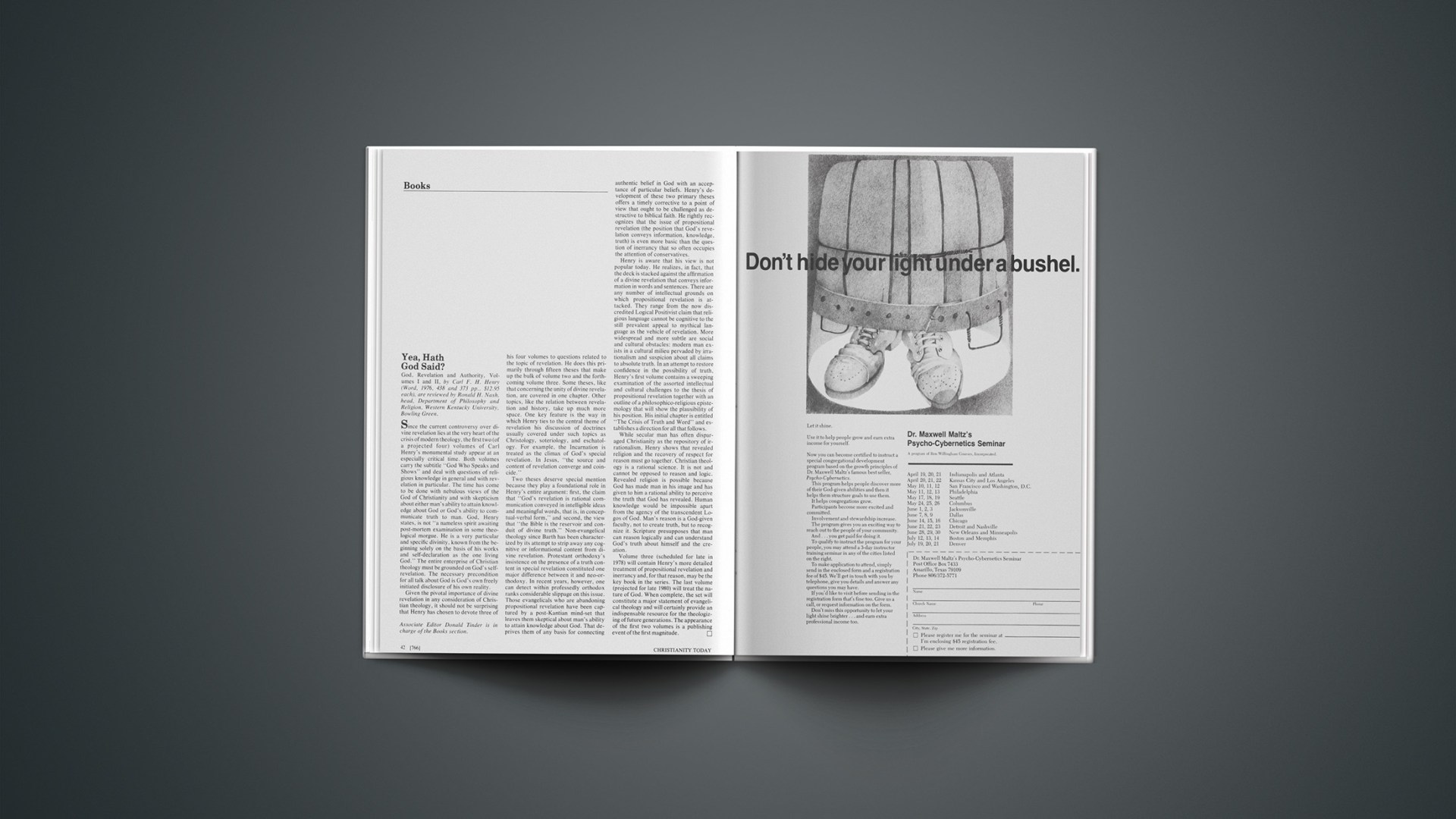Do we really live in the “day of the evangelical”?
In some evangelical circles it is considered spiritually unpatriotic to voice doubt. Those not given to evangelical puffery are often considered cynics and personally out of touch with the remarkable spiritual breakthroughs that supposedly attest that an evangelical awakening is under way in America.
The national media depicted 1976 as “the year of the evangelical.” The Gallup Poll reported the beginnings of religious revival in the United States. Evangelical Christianity displays ongoing visibility as a life-changing force; witness Charles Colson, Eldridge Cleaver, Graham Kerr (the “Galloping Gourmet”), and others. Conservative churches are growing, and evangelical seminaries are burgeoning with students. The White House now lodges an openly evangelical president who hesitates neither to carry a Bible nor to teach a Sunday-school class.
No one should underestimate the religious importance of these and other recent evangelical trends. The reemergence of evangelical Christianity to national prominence—in contrast to its subculture role a generation ago—is among the striking religious developments of the last quarter century. The dynamic Graham crusades, the penetration by Christianity Today, the steady growth of evangelical divinity centers, the impact of Campus Crusade for Christ and Inter-Varsity among students, the discipling ministry of Navigators, the Urbana conferences that channel young intellectuals to distant mission fields, the emergence of conservative scholars in biblical studies, are only some of the formative contributions to this phenomenon.
Among major trends in American religious life in the past two decades have surely been the evident deterioration of nonevangelical Protestantism (represented by ecumenical initiatives), the disarray of Roman Catholicism with its authority crisis, and the public reemergence of evangelical Christianity as a life-transforming power manifested both in vigorous local churches and in thousands of house groups.
Yet no objective observer of the American scene can stop there, for overarching all these trends is an increasing secularization of American society. Its stranglehold is reshaping the basic values of home and family, molding the mental and moral attitudes in schoolrooms and campuses, and maneuvering the mass media into a bold mirroring of the rampant permissiveness and relativism of our day. A little thought about this radical secularism ought to puncture, certainly temper, our evangelical euphoria over present-day American religion. Say what it may about incipient religious revival, the Gallup Poll overlooks the multiform and even contradictory character of religious phenomena; it does not evaluate the fact that belief in God and expectation of a brighter immortality exist side by side with astounding, soaring statistics of abortion, crime, divorce, drug addiction, gambling, prostitution, shoplifting, and so on.
It is exceedingly risky—in view of the secularization of American learning and life—for evangelicals to think they are now controlling the formative cultural forces in our society. It will do Christian witness little good to bask in the day of the evangelical if the deepening night of secularism increasingly overshadows an all too feeble light. Evangelical Christianity has not yet in fact very deeply penetrated the radically secular mentality evident in schoolroom and society today and reflected by the media.
Conservative religious forces tend to look cosmetically impressive because neo-Protestant ecumenism has declined and because evangelical enterprises are reclustering. In financially inflationary times, the geographical huddling of related enterprises has much merit for promoting institutional economy and achieving mutual goals. Establishment of the Graham Center at Wheaton College and relocation nearby of Christianity Today will doubtless strengthen regional agencies like the National Association of Evangelicals, Moody Bible Institute, Trinity Evangelical Divinity School, and numerous missions enterprises. The suburban Chicago area may become something like an evangelical heartland for the nation.
But such clustering also has its risks and liabilities, particularly if its motivation is protective rather than penetrative. To cluster agencies not especially distinguished for cultural penetration, and in some cases motivated by a desire to escape the inroads of non-evangelical influence, may through aseptic isolation nurture an unfortunate illusion of strength at the cost of neglect of the secular world.
In some respects one can sense a thawing climate for evangelical penetration. An anguished sense of personal emptiness engulfs multitudes who once thought that moral relativism was the route to personal fulfillment. The life-changing power of the Gospel seen in the astonishing transformation of erstwhile “ugly Americans,” the spectacle of a Bible-carrying presidential family reassured by the vitalities of revealed religion, the churchgoing throngs whose homes are happy and whose lives are buoyant, cannot but provoke many emotionally frayed seekers to wonder whether they have overlooked an unsuspected treasure. The godly example of leaders in high places and of neighbors at the local level can stir the conscience of a relativistic age, evoking self-examination and a longing for better things. A television series like Alex Haley’s Roots, for all its stereotyping, mirrors what a people do to themselves when a moral and spiritual heritage is perverted; it attests, too, the potential moral power of the media.
Impressive as they are, such factors stop far short of a cultural setting in which evangelical Christianity wields a shaping initiative. But they can be the first waves of a winsome argument that places its hearers on the defensive.
There are distressing signs, however, that personal ambition and internal conflict among evangelical frontiersmen may strip the term “evangelical” of the gains that in a single generation made it once more a bright symbol of religious hope. Will maneuvering on both the right and the left politicize and institutionalize the polemical differences that have recently been revived? Will we see an emerging era of evangelical controversy, or will evangelicals unite for spiritual awakening in our needy land?










